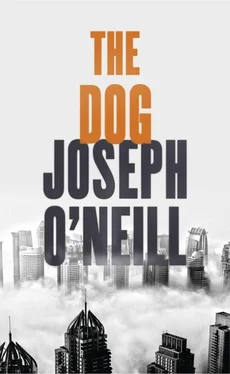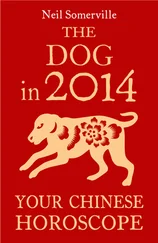Joseph O’Neill - The Dog
Здесь есть возможность читать онлайн «Joseph O’Neill - The Dog» — ознакомительный отрывок электронной книги совершенно бесплатно, а после прочтения отрывка купить полную версию. В некоторых случаях можно слушать аудио, скачать через торрент в формате fb2 и присутствует краткое содержание. Год выпуска: 2014, Издательство: HarperCollins Publishers, Жанр: Современная проза, на английском языке. Описание произведения, (предисловие) а так же отзывы посетителей доступны на портале библиотеки ЛибКат.
- Название:The Dog
- Автор:
- Издательство:HarperCollins Publishers
- Жанр:
- Год:2014
- ISBN:нет данных
- Рейтинг книги:4 / 5. Голосов: 1
-
Избранное:Добавить в избранное
- Отзывы:
-
Ваша оценка:
- 80
- 1
- 2
- 3
- 4
- 5
The Dog: краткое содержание, описание и аннотация
Предлагаем к чтению аннотацию, описание, краткое содержание или предисловие (зависит от того, что написал сам автор книги «The Dog»). Если вы не нашли необходимую информацию о книге — напишите в комментариях, мы постараемся отыскать её.
A funny and wholly original work of international literature,
is led by a brilliantly entertaining anti-hero. Imprisoned by his endless powers of reasoning, hemmed in by the ethical demands of globalized life, he is fatefully drawn towards the only logical response to our confounding epoch.
The Dog — читать онлайн ознакомительный отрывок
Ниже представлен текст книги, разбитый по страницам. Система сохранения места последней прочитанной страницы, позволяет с удобством читать онлайн бесплатно книгу «The Dog», без необходимости каждый раз заново искать на чём Вы остановились. Поставьте закладку, и сможете в любой момент перейти на страницу, на которой закончили чтение.
Интервал:
Закладка:
Writing mental mail eats up time and energy. An hour passes before I have worded the foregoing to my (relative) contentment and I’m able to think about attending to my real work and my number-one priority, which is drafting my personal disclaimers. I lack attentiveness, though. I am too worn out and bothered. Normally I would take forty winks but God damn it I cannot on account of the stoolie in the corner.
The day after my pedicure, Ollie called to say that ‘the diving community’ was putting together a ‘search and rescue party’ for Ted Wilson. Ollie said, ‘I guess they’re asking us to go out and look for him. Leave no man behind and all that.’
Of course the correct response to this ridiculous idea would have been to ridicule it. But no — I was flattered to have been identified as a significant member of the ‘diving community’ and to have been handpicked for this special operation, I who had not pulled on a set of fins in over a year. I solemnly agreed to ‘report’ at 0430 the next morning at the Spinneys in Jumeira and from there head out to Oman in what was subsequently referred to, surely erroneously, as a ‘rolling thunder’ convoy.
I arrived at Spinneys in my silver-grey Autobiography just as Paolo Weiss was arriving in his silver-grey Autobiography. I recognized a few other faces/cars. Dionisi Ottomanelli was there in his Jaguar XJ220, as was the Ferrari F430 of Jesper and Ingrid Poulsen. Keith Botha’s Bentley Arnage T was unmistakable, even in the dark. We stood around in the parking lot with the restlessness of men and women on a mission. If anyone was a close friend of Ted Wilson, they didn’t say so. Jesper Poulsen disclosed that he had once asked Wilson what drove him to dive. ‘He said, “Because nobody can phone me underwater.”’ This drew a laugh of assent. Trevor Winters, the diving-school owner and the chief instigator, planner and leader of our venture, conducted the briefing. He reminded us that Ted Wilson’s ‘diving transport’ was his Mazda MX-5 Miata Sport automatic, and that the first sign of his whereabouts could well take the form of this vehicle. There was no need for Trevor to mention that the peninsular waters are practically unlimited and that the likelihood of any one of us finding the Man from Atlantis, or what remained of him, in the ocean, was very slight. For this reason, perhaps, nobody made mention of it, although Keith Botha did ask whether, in view of the troubling passage of time since Ted Wilson had last been seen — it had been a week — our outing should be ‘downgraded’ from an ‘S & R’ operation to a ‘search’ operation. Trevor said, ‘Keith, I’d like us to go out there today with a little hope in our hearts. But you’re right. We have to be ready for the worst.’
It was a sombre and burdened and exhilarated group of coffee-drinking, scuba-qualified automobilists that set forth from Spinneys at 0500 on the dot, and we must have offered an inexplicable spectacle as we moved in the morning-night through Dubai and Sharjah in a slow-moving, tailgating, fifteen-strong procession of, inter alia, C- and CLC–Class Mercedes-Benzes, Porsches Cayman and Cayenne and Carrera, a 1 series BMW, two Audi A3 Sportbacks, and a Nissan GT-R. The undertaking was governed by a mighty mood of adventure. Certainly, and speaking for myself, it was that very rare occasion when one’s fictitiousness feels euphorically correct. I was no less animated and purposeful than if I’d been setting out to look for Red Rackham’s treasure; and, as I travelled through the nocturnal cities, it was as if an existential transfer or translation had taken effect and it was the case without counterfactuality that I was an aquanaut and the cabin of the Autobiography, dark except for the dashboard’s fire of needles and numerals, was that of a submersible passing between batholiths and brilliant upright reefs; and it was the equally real case, as the convoy turned east onto the E88 and quickened through the desert, that the moon gave the slip to a constabulary of moon-brightened clouds. Usually I find dawns disgusting: up in the Hajar Mountains, the appearance at the ocean’s edge of yellow and apricot hues provoked a happy sense of daybreak I had not felt since, it may be, I was a just-qualified attorney and in the first purr of Midtown Tunnel traffic I walked to work through empty, wintry Murray Hill, and the overnight snow, cleanly banked on every sidewalk, loomed for me as the cliffs of Dover once loomed for English seafarers. What a home the world was! What a drama! It didn’t matter that my part was that of the lemon hurrying to its juicer. I still had the verve, after twelve-hour days, for an office romance with the Beautiful Jennifer Horschel.
(That was the name applied to her by certain wistful male co-workers. In secret fact, Jenn’s legal name was simply ‘Jenn’. This monosyllable, whose dwarfism I found only endearing, was one of the things Jenn held against her parents even as she accepted that in this instance they had not sought to injure or handicap or short-change her but merely to give her a nice name. To make Jenn feel better, I let her in on my most embarrassing secret: my first given name. This unutterable word had been written on my birth certificate in honour of a Swiss great-uncle. From high school onwards, I disclosed its existence only under bureaucratic duress, when filling out forms. Jenn said, ‘You have a secret name? What is it?’ Very vulnerably, I told her — which is to say, wrote it down on a piece of paper. She stifled a shriek. ‘Oh my God,’ she said. ‘You poor, poor thing.’ (Not long after, a busybody in the law firm’s HR department saw fit to exhume this forename ‘as a matter of good order’. Ridiculously, my professional name thereafter began with the initial ‘X.’. ‘It’ll make you stand out,’ the busybody said. ‘It’ll give you an X factor.’ How right he proved to be.) My revelation did make Jenn feel better, but her hatred of her own name was not lessened. I believe that having a stunted or halved name must in her mind have symbolized the improvidence of her chaotic upbringing in and around the Lehigh Valley, Pennsylvania, which left her unsuffixed in some broader sense and certainly did not equip her with the familial support enjoyed by so many of her peers at Dartmouth (to which she transferred from Penn State) and at law school in Georgetown, evidently few of whom had to combine their studies with crappy jobs or needed to make room in their lodgings for a half-sister fleeing a violent boyfriend or, for several weeks, another half-sister released on parole from Lehigh County Prison. When I met Jenn, she was holed up in a doorman building on Second Avenue, up by the Queensboro Bridge. She was twenty-six — one year younger than me but (as a result of three wavering semesters I spent at grad school) one year my senior at the firm. Her seniority wasn’t just chronological. Jenn seemed unnaturally more experienced than me, able somehow to see things more quickly, as if an all-seeing tipster whispered in her ear. I guess she saw a lot, growing up — more than I saw in Zurich or Connecticut. We were both in Corporate — I in insolvency and restructuring, she in securities. She was regarded as a young superstar. We got to know each other in the cafeteria, late at night. At first we talked about the partners, those improbable fascinators; but as we continued to meet, Jenn offered a monologue, amusing and ethnological in tone, about the dark difficulty that was her youth. Combining the mentalities of the caseworker, the confidant, and the one who has a crush, I listened to her in a state of moral and romantic excitement; I even thought of taking notes, so importantly communicative seemed her disclosures of the Horschel clan’s fuckups and tribulations, the like of which I had never come across except on TV and which left me, in relation to Jenn, with an edgeless feeling of duty. I somehow came to believe that this very lovely and intelligent and in all respects admirable person was gravely in need of help and, by fantastic good luck, this added up to a need for me. When Jenn and her Conran sofa moved into my rent-stabilized one-bedroom (in August 1998), it gave me great pleasure to write letters to her parents and siblings to the effect that she was now under my protection, that her days of housing and bailing out and bankrolling Horschels were over, that any communication with her would have to come through me, and that anyone who tried to interfere in her affairs would have to deal with yours truly. I described myself as Jenn’s ‘partner’. There was no question of our getting married because Jenn’s parents had gone through six marriages between them and as a consequence their daughter feared the blessed estate. I, too, feared the blessed estate, even though my parents married only once. Work sanctified our union. We were always working. When I try to think of times Jenn and I were actually in the same room and happy to be there, I think of those early days when she would bring home work and I would spend hours at her side, helping to draft client letters and notes of advice. My contribution was chiefly linguistic; Jenn, the much better attorney, contributed the analysis. She made partner at thirty; I never did, and in due course moved sideways, into private client work. At our tête-à-tête dinner to celebrate her elevation, Jenn said that she would have a baby when she was thirty-four. That should give me enough time to establish myself, she said. Very good, I said, interiorly running to keep up. What about buying an apartment? she asked. I told her that I liked the rent-stabilized one-bedroom and that the financial logic of surrendering the rent-stabilized lease in favour of property ownership was unclear. OK, Jenn said, contentedly galloping on. But we’ll get a bigger place after the baby, OK? OK, I said.
Читать дальшеИнтервал:
Закладка:
Похожие книги на «The Dog»
Представляем Вашему вниманию похожие книги на «The Dog» списком для выбора. Мы отобрали схожую по названию и смыслу литературу в надежде предоставить читателям больше вариантов отыскать новые, интересные, ещё непрочитанные произведения.
Обсуждение, отзывы о книге «The Dog» и просто собственные мнения читателей. Оставьте ваши комментарии, напишите, что Вы думаете о произведении, его смысле или главных героях. Укажите что конкретно понравилось, а что нет, и почему Вы так считаете.












